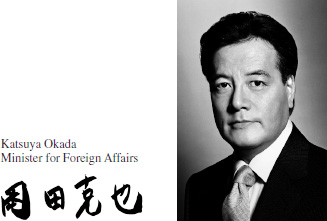Japan's Official Development Assistance White Paper 2009
Foreword
Since I assumed the office of Minister for Foreign Affairs in September 2009, I have been thinking about how Japan, in pursuing its foreign policy based on the understanding and trust of the Japanese people, should promote international cooperation to achieve peace and affluence for the people of the world and to allow the people of Japan to fully appreciate peace and affluence.
In the present international community, a number of issues remain unsettled. While the global economy appears to have emerged from the worst stage of the crisis, it is still struggling on the path to recovery. It is also the harsh reality that many people around the world suffer from hunger and disease, conflict, climate change, and natural disasters such as earthquakes, and live hard lives in which they can hardly maintain their dignity as human beings. For example, in January 2010, many people lost their lives in the large-scale earthquake in Haiti. Japan, as an earthquake-prone country, will contribute actively to Haiti's reconstruction, making good use of its knowledge and experience. Furthermore, as the achievement of the Millennium Development Goals (MDGs) is being threatened notably in the sub-Saharan region of Africa, Japan will continue and strengthen the Tokyo International Conference on African Development (TICAD) process, and redouble its efforts collectively with the international community for the achievement of the MDGs.
It is important that, not becoming inward-looking, we sympathize as a fellow human being, with the people who are struggling throughout the world and provide support for developing countries with a view to realizing human security. Japan will also provide seamless assistance for peacebuilding, from emergency humanitarian assistance to support for the political process, security improvement, and reconstruction and development.
Based on this concept, in the relatively short period since the inauguration of the new government, Japan has taken leadership and announced various initiatives in response to the challenges confronting the international community. In November 2009, Japan pledged to provide new assistance to Afghanistan up to an amount approximately US$5 billion over a period of about five years. With regard to climate change, at the 15th Conference of the Parties to the United Nations Framework Convention on Climate Change (COP15) in December 2009, Japan pledged new assistance under the Hatoyama Initiative. This assistance is broad in scope and encompasses developing countries which are tackling climate change through measures such as emission reductions, or which are vulnerable to the negative impact of climate change.
Including these initiatives of the new government, this White Paper focuses on Japan's response to the global financial and economic crisis, assistance to Afghanistan and Pakistan, and efforts to address environment and climate change issues.
It is my view that Japan's current development assistance has not attracted sufficient sympathy of the Japanese people. Hence, I announced that we will conduct a basic review of Official Development Assistance (ODA) by around the summer in 2010. We are now undertaking tasks in the lead-up to the review. Through these efforts, Japan will not only implement ODA more strategically and effectively but also enhance both the quality and volume of ODA with the public understanding and support.
Japan's international cooperation is conducted in the spirit of the preamble to the Japanese Constitution, which sets out the "determination" of the Japanese people to contribute to the international community. ODA is implemented not only by the government, but also with the participation of a wide range of people. It is essential that Japan further promotes partnerships with diverse stakeholders, including non-governmental organizations (NGOs), the private sector, and international organizations. The columns of this White Paper give spotlight to the activities of the Japanese people who are active around the world mostly as aid practitioners, and introduce specific examples of Japan's international cooperation.
I hope that this White Paper will make international cooperation more accessible to you, and enhance your interest in and understanding of Japan's international cooperation.
March 2010

